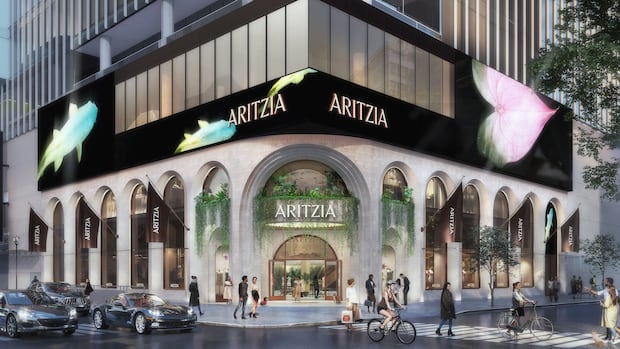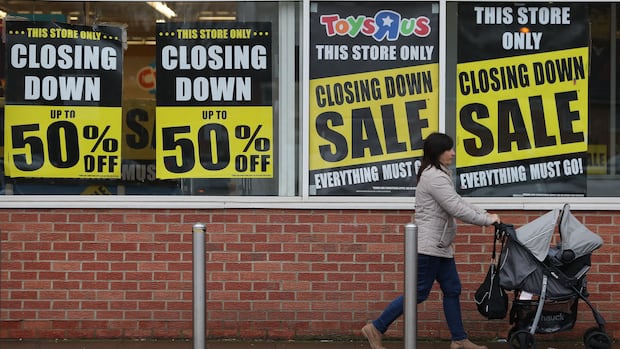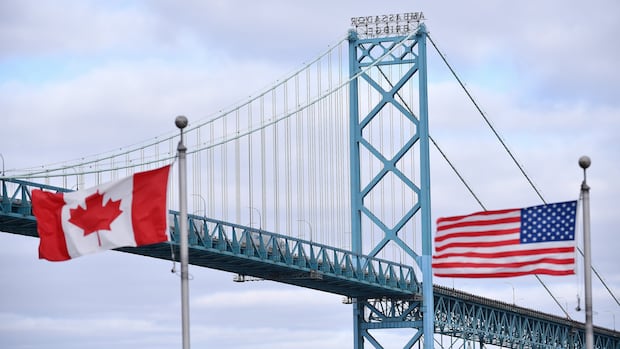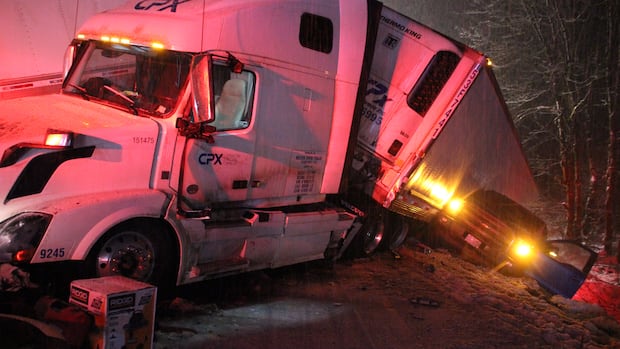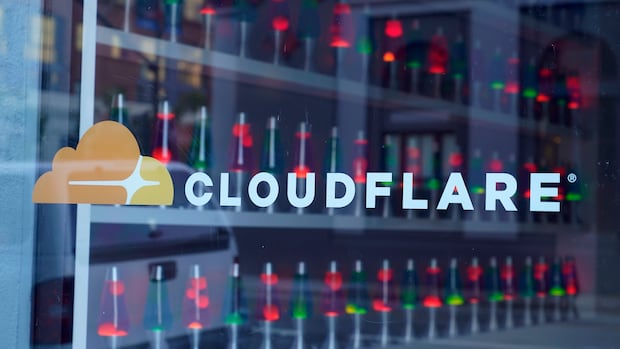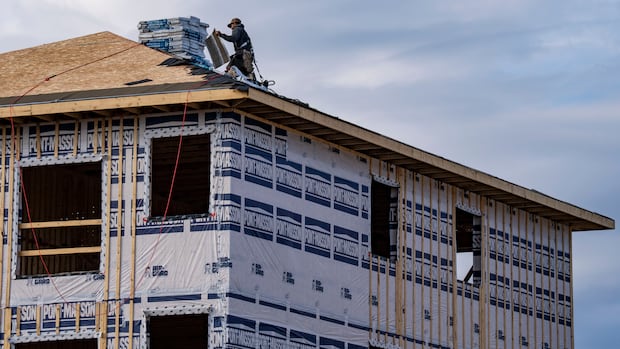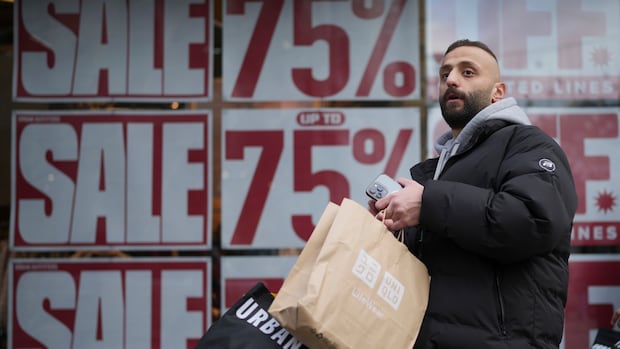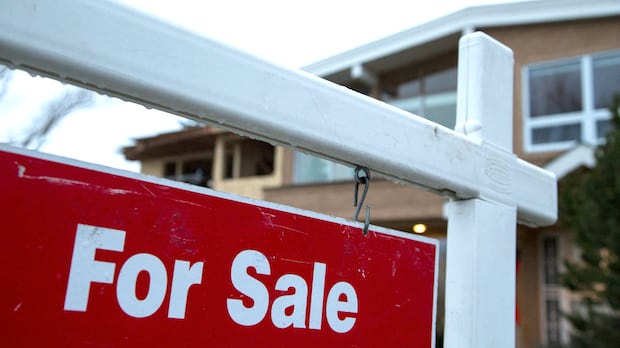The much-awaited trailer for Pixar's Toy Story 5 dropped last week, revealing a new toy joining the beloved playtime crew: a tablet.
In the description posted on YouTube, Pixar writes, "The age of toys is ... over?"
Rex the dinosaur and Slinky Dog shake with anticipation as the delivery box arrives. Woody and Buzz Lightyear cling to each other as INXS's iconic Never Tear Us Apart plays in the background.
It's just a movie, but the cartoon scene also dramatizes a real threat. In the age of screens, amid reports of retail stores struggling and studies suggesting that all kids want for Christmas are Robux, what does the future hold for the toy industry?
What are you doing to keep costs down this holiday season? We want to hear from you. Send an email to ask@cbc.ca.A number of different forces are at play in the market, said Doug Stephens, a retail adviser, author, and the founder and CEO of Retail Prophet — not the least of which are falling birthrates, where fewer kids means fewer customers compared with the toy boom we saw in the 1950s and '60s.
We also live in a world of saturated distribution, where Amazon or any third-party marketplace can deliver practically any toy to your doorstep, which greatly reduces the need for big-box toy stores, Stephens told CBC News.
But then, there are also screens.
"The whole realm of online and digital consoles have just obliterated the toy category," Stephens said.
"Over the past 20 years, we have just seen a surge in gaming, we've seen a huge surge in the sale of gaming consoles and it's almost become a subculture."
WATCH | B.C. family sues Roblox over 'addictive' design:A B.C. father filed a lawsuit on behalf of his 12-year-old, alleging Roblox is designed with ‘addictive, manipulative and financially exploitative’ features and gameplay elements. The civil claim seeks certification of a class-action lawsuit against Roblox and its Canadian arm. Roblox has not filed a legal response, according to online court records, and the company did not immediately respond to an emailed request for comment.The rise and fall of big-box toy storesThe baby boomer era was, in many ways, peak toy store. Economic prosperity in North America, a soaring birth rate and a more child-focused culture all helped fuel a toy boom, notes the North Carolina Museum of History.
In addition, new types of plastics were more widely available, which made manufacturing toys easier and less expensive, according to the Strong National Museum of Play.
In 1957, businessman Charles Lazarus launched Toys ‘R’ Us, the first big-box toy store, notes the History Channel. That era also ushered in some of the most iconic toys of all time, the History Channel explains, like Mr. Potato Head, Matchbox cars and Barbie.
 A boy looks at the goods on offer in a toy store in the 1950s. (Keystone View/FPG/Getty Images)
A boy looks at the goods on offer in a toy store in the 1950s. (Keystone View/FPG/Getty Images)By 2018, however, things had changed. Plagued by long-term debt, online shopping and the rise of gaming, Toys 'R' Us filed for bankruptcy protection and then liquidated its U.S. operations. By 2021, all of its U.S. stores were gone.
On Sunday, the Edmonton Journal and the Financial Post reported that Toys 'R' Us Canada closed some 38 stores this year and put another 12 up for sale. The national retail chain that once had 103 Canadian locations now has only 40, according to the report.
In a statement to CBC News, a spokesperson for Toys 'R' Us Canada said it was "making strategic changes to better meet the needs of Canadian families and reimagine the toy experience."
The statement did not specifically address the closure of stores but said Toys 'R' Us Canada continues to invest in new locations.
The issues facing toy stores also aren't limited to Toys 'R' Us. Canadian retailer Mastermind Toys was rescued from the brink of bankruptcy in 2023, closing 18 stores and selling the bulk of its business to Unity Acquisitions.
As Retail Insider points out, that acquisition preserved 48 of the Toronto-based company's stores and 85 per cent of its staff.
WATCH | Canada's Mastermind Toys files for creditor protection in 2023:Well-known Canadian specialty toy and children’s book retailer Mastermind GP Inc. has been granted protection from its creditors as it struggles to restructure amid financial challenges and a slowing economy. It’s seeking permission to close some stores after the holiday season as it wrestles with millions in debt.Toy sales actually up — just not necessarily for kidsYet despite the apparent struggles of big-box toy stores, Canadian toy sales are rising this year, according to retail data provided to CBC News by the Canadian Toy Association, The Toy Association in the U.S. and market research company Circana.
Canadian toy sales were up 18 per cent in the first half of 2025 compared with the same period last year, with games, puzzles and building sets leading the push, Circana said.
The sales data and industry trends indicate that traditional toys — like games, building sets, trading cards, plush and collectibles — continue to be in high demand, said Kristin Morency Goldman, a spokesperson for The Toy Association.
And according to marketing data company IBIS World, there are actually more hobby and toy stores in Canada now compared with last year — about 4,100 of them across the country in 2025, a growth rate of 3.7 per cent.
 Lego sets designed for people aged 18 and up are on display in a Lego store in Miami in May 2023. (Joe Raedle/Getty Images)
Lego sets designed for people aged 18 and up are on display in a Lego store in Miami in May 2023. (Joe Raedle/Getty Images)So, what's with the discrepancy? It kind of comes down to how you define toys, said Andrew Wagar, president and CEO of Swerve Strategic Marketing and a board member of the Canadian Toy Association.
"The major driver of that growth are adult toy-buyers or what we could call in the industry 'adult collectors' — or the trending term is 'kidult,'" Wagar told CBC News.
It's the "kidults" who are buying Lego, Pokémon cards, action figures and collectibles, he said, and they're willing to pay more for them. The retailers who have recognized and leaned into that market are doing well, Wagar said.
So while we're seeing a decrease in big-box stores like Toys 'R' Us — in part due to e-commerce and Walmart and Amazon taking the market share of toy shoppers — we're seeing an increase on the hobby side, he said.
"Where do local collectors go to buy? They want to go to the local hobby and toy store."
 Travis Hunter of the NFL's Jacksonville Jaguars opens a pack of Pokémon cards before a game against Kansas City, in Jacksonville, Fla., on Oct. 6. (Mike Carlson/Getty Images)'All I want for Christmas is Robux'
Travis Hunter of the NFL's Jacksonville Jaguars opens a pack of Pokémon cards before a game against Kansas City, in Jacksonville, Fla., on Oct. 6. (Mike Carlson/Getty Images)'All I want for Christmas is Robux'A viral YouTube video called "All I want for Christmas is Robux" made the internet rounds a few years ago. The melodic parody of Mariah Carey's Christmas anthem is about online game Roblox's in-game currency, called Robux.
Again, it's just a video, but like Toy Story 5's tablet, it tells a deeper story about the kind of toys a lot of kids want. Parenting forums are rife with complaints about their children asking for Robux, calling it an "invisible gift," while also frequently suggesting the in-game currency gift cards for stocking stuffers.
Meanwhile, multiple top toy lists for this holiday season feature the $700 Nintendo Switch 2 + Mario Kart World Bundle, and a new study out of the Entertainment Software Association says more than half of the roughly 700 kids it surveyed plan to ask for video game content this Christmas.
But as the traditional toy industry has suffered through this surge, there's also an "awakening" happening now as we learn more about screen time and development, and parents are looking for alternatives such as traditional games, said Stephens of Retail Prophet.
 A screen grab of an Instagram post by Toys 'R' Us Canada from Sept. 6, 2025, shows the PlayLab available in some stores. (@ToysRUsCanada/Instagram)
A screen grab of an Instagram post by Toys 'R' Us Canada from Sept. 6, 2025, shows the PlayLab available in some stores. (@ToysRUsCanada/Instagram)Still, when you're up against the convenience of Amazon, any retailer — toys or not — needs to ask themselves what they offer to customers that other retailers don't, Stephens said.
That's why we're now seeing some toy stores focus more on experiences and play — somewhere to go to have fun with your child, he said. In Calgary, for instance, Cherry Tree Lane Toys hosts events and offers birthday party packages. Minotaur in Kingston, Ont., hosts weekly craft nights and twice-weekly game nights.
"Stores that sell products are dying. Stores that sell experiences are rising," Stephens said.
Which may be why Toys 'R' Us, in its email to CBC News, said part of its strategic changes include expanding its new free-with-purchase play gym and "birthday party experience" across many stores.
WATCH | Toy industry hopes to bounce back:Changes in consumer behaviour have had a big impact on the toy industry, particularly smaller businesses. Toy sales are down across the entire country, but Calgary's toy stores are hoping some creativity will help attract customers.

